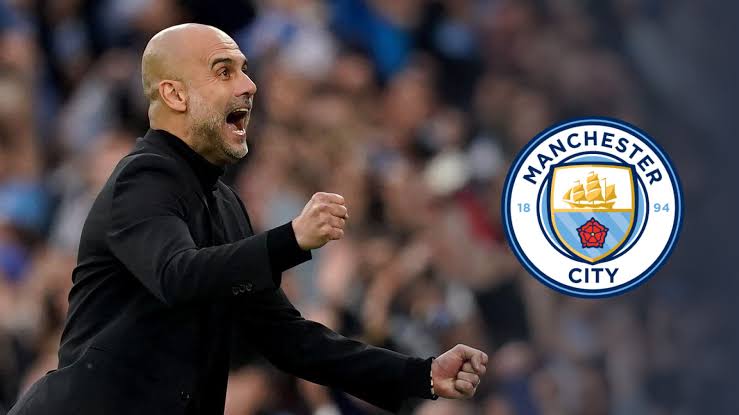Manchester City reach verbal agreement with Uefa Champions League finalist

Manchester City’s summer transfer window has been characterized by strategic acquisitions and unexpected departures, with the Premier League champions now turning their attention to securing a bargain deal from one of Europe’s elite clubs. According to recent reports, City have initiated preliminary discussions with a club that reached the Champions League final last season, targeting one of their key players in what could prove to be a shrewd piece of business for Pep Guardiola’s side.
The Citizens have already demonstrated their intent to strengthen across multiple positions during the current transfer window. Their recruitment strategy has been both ambitious and calculated, addressing specific weaknesses while planning for the future. The club has successfully completed the signings of goalkeeper Marcus Bettinelli, left-back Rayan Ait-Nouri, midfielder Tijjani Reijnders, and versatile attacker Rayan Cherki, representing a combined investment that reflects their commitment to maintaining their position at the summit of English and European football.
Each of these acquisitions serves a distinct purpose within Guardiola’s tactical framework. Bettinelli brings experience and reliability between the posts, providing crucial depth in a position where City have often relied heavily on their first-choice goalkeeper. The addition of Ait-Nouri addresses the left-back position, where City have sought greater defensive solidity while maintaining their attacking threat from wide areas. Meanwhile, Reijnders’ arrival in midfield adds creativity and dynamism to an already star-studded engine room, while Cherki’s versatility across the forward line provides Guardiola with additional tactical flexibility
Despite these impressive additions, City’s transfer business remains incomplete, with the right-back position emerging as a priority area requiring immediate attention. The situation has been complicated by the unexpected departure of Kyle Walker, who had fallen out of favor with the coaching staff and was subsequently sent out on loan during the previous campaign. Walker’s shock permanent exit has created a significant void in City’s defensive structure, one that demands urgent resolution.
Walker’s departure represents more than just the loss of a player; it signifies the end of an era for a defender who had been instrumental in City’s recent successes. His pace, defensive acumen, and ability to contribute in attacking phases made him a valuable asset under Guardiola’s system. However, tactical disagreements and the natural evolution of the squad meant that his time at the Etihad Stadium had come to an end, necessitating a replacement who could seamlessly integrate into the existing framework
The most intriguing development in City’s transfer activities concerns their reported interest in a player from a club that reached the Champions League final in the previous season. This connection suggests that City are targeting individuals who have proven themselves at the highest level of European competition, demonstrating their commitment to maintaining their elite status. The fact that talks have been initiated indicates that both parties view a potential deal as mutually beneficial, with City seeking quality reinforcement while the selling club may be willing to negotiate for financial or strategic reasons.
The identity of the Champions League finalist club adds another layer of complexity to the negotiations. Clubs that reach such prestigious finals typically command premium prices for their key players, making any potential “bargain” transfer particularly noteworthy. This situation could arise from various factors, including the player’s contract situation, the selling club’s financial requirements, or strategic decisions regarding squad restructuring.
City’s approach to the transfer market has always been characterized by their willingness to invest substantially in quality players, but their recent activities suggest a more nuanced strategy. The pursuit of what is described as a “bargain” transfer indicates that the club are increasingly conscious of financial fair play regulations and the need to balance their books while maintaining competitive strength. This approach reflects the broader evolution of football’s transfer market, where clubs must be increasingly creative in their dealings to comply with financial regulations while still attracting top talent.
The current economic climate in football has created opportunities for clubs like City to secure quality players at reduced prices. The financial pressures faced by many European clubs, combined with the need to comply with various regulatory frameworks, have created a market where even elite players can potentially be acquired for less than their perceived market value. City’s ability to capitalize on these opportunities while maintaining their squad quality demonstrates their sophisticated approach to modern football management.
The potential acquisition of a player from a Champions League finalist would have significant tactical implications for Guardiola’s system. The Spanish manager has consistently emphasized the importance of having players who understand the demands of elite-level football, and any player who has reached a Champions League final would possess this crucial experience. Such an addition would not only strengthen City’s squad depth but also provide valuable mentality and leadership qualities that can prove decisive in crucial moments.
The integration of new signings into City’s complex tactical system requires careful consideration of how each player fits into the overall framework. Guardiola’s preference for versatile players who can adapt to multiple positions and tactical situations means that any new arrival must demonstrate both technical ability and tactical intelligence. The fact that City are targeting a player from a Champions League finalist suggests confidence in the individual’s ability to meet these demanding requirements.
City’s transfer activities occur within the context of intense competition from other elite clubs across Europe. The Premier League, in particular, has seen unprecedented levels of investment as clubs seek to establish themselves among the continent’s elite. City’s ability to continue attracting top talent while managing their financial obligations demonstrates their strong position in the global football hierarchy.
The competitive landscape has been further complicated by the emergence of new financial powerhouses and the continued strength of traditional European giants. City’s success in securing their target signings while maintaining fiscal responsibility reflects their mature approach to squad building and their understanding of the modern football ecosystem.
Manchester City Transfer News: Champions League Finalist Talks and Summer Rebuild
Manchester City’s summer transfer window has been characterized by strategic acquisitions and unexpected departures, with the Premier League champions now turning their attention to securing a bargain deal from one of Europe’s elite clubs. According to recent reports, City have initiated preliminary discussions with a club that reached the Champions League final last season, targeting one of their key players in what could prove to be a shrewd piece of business for Pep Guardiola’s side.
City’s Summer Recruitment Drive
The Citizens have already demonstrated their intent to strengthen across multiple positions during the current transfer window. Their recruitment strategy has been both ambitious and calculated, addressing specific weaknesses while planning for the future. The club has successfully completed the signings of goalkeeper Marcus Bettinelli, left-back Rayan Ait-Nouri, midfielder Tijjani Reijnders, and versatile attacker Rayan Cherki, representing a combined investment that reflects their commitment to maintaining their position at the summit of English and European football.
Each of these acquisitions serves a distinct purpose within Guardiola’s tactical framework. Bettinelli brings experience and reliability between the posts, providing crucial depth in a position where City have often relied heavily on their first-choice goalkeeper. The addition of Ait-Nouri addresses the left-back position, where City have sought greater defensive solidity while maintaining their attacking threat from wide areas. Meanwhile, Reijnders’ arrival in midfield adds creativity and dynamism to an already star-studded engine room, while Cherki’s versatility across the forward line provides Guardiola with additional tactical flexibility.
The Right-Back Conundrum
Despite these impressive additions, City’s transfer business remains incomplete, with the right-back position emerging as a priority area requiring immediate attention. The situation has been complicated by the unexpected departure of Kyle Walker, who had fallen out of favor with the coaching staff and was subsequently sent out on loan during the previous campaign. Walker’s shock permanent exit has created a significant void in City’s defensive structure, one that demands urgent resolution.
Walker’s departure represents more than just the loss of a player; it signifies the end of an era for a defender who had been instrumental in City’s recent successes. His pace, defensive acumen, and ability to contribute in attacking phases made him a valuable asset under Guardiola’s system. However, tactical disagreements and the natural evolution of the squad meant that his time at the Etihad Stadium had come to an end, necessitating a replacement who could seamlessly integrate into the existing framework.
Champions League Finalist Connection
The most intriguing development in City’s transfer activities concerns their reported interest in a player from a club that reached the Champions League final in the previous season. This connection suggests that City are targeting individuals who have proven themselves at the highest level of European competition, demonstrating their commitment to maintaining their elite status. The fact that talks have been initiated indicates that both parties view a potential deal as mutually beneficial, with City seeking quality reinforcement while the selling club may be willing to negotiate for financial or strategic reasons.
The identity of the Champions League finalist club adds another layer of complexity to the negotiations. Clubs that reach such prestigious finals typically command premium prices for their key players, making any potential “bargain” transfer particularly noteworthy. This situation could arise from various factors, including the player’s contract situation, the selling club’s financial requirements, or strategic decisions regarding squad restructuring.
Financial Considerations and Market Dynamics
City’s approach to the transfer market has always been characterized by their willingness to invest substantially in quality players, but their recent activities suggest a more nuanced strategy. The pursuit of what is described as a “bargain” transfer indicates that the club are increasingly conscious of financial fair play regulations and the need to balance their books while maintaining competitive strength. This approach reflects the broader evolution of football’s transfer market, where clubs must be increasingly creative in their dealings to comply with financial regulations while still attracting top talent.
The current economic climate in football has created opportunities for clubs like City to secure quality players at reduced prices. The financial pressures faced by many European clubs, combined with the need to comply with various regulatory frameworks, have created a market where even elite players can potentially be acquired for less than their perceived market value. City’s ability to capitalize on these opportunities while maintaining their squad quality demonstrates their sophisticated approach to modern football management.
Tactical Implications and Squad Balance
The potential acquisition of a player from a Champions League finalist would have significant tactical implications for Guardiola’s system. The Spanish manager has consistently emphasized the importance of having players who understand the demands of elite-level football, and any player who has reached a Champions League final would possess this crucial experience. Such an addition would not only strengthen City’s squad depth but also provide valuable mentality and leadership qualities that can prove decisive in crucial moments.
The integration of new signings into City’s complex tactical system requires careful consideration of how each player fits into the overall framework. Guardiola’s preference for versatile players who can adapt to multiple positions and tactical situations means that any new arrival must demonstrate both technical ability and tactical intelligence. The fact that City are targeting a player from a Champions League finalist suggests confidence in the individual’s ability to meet these demanding requirements.
Competition and Market Positioning
City’s transfer activities occur within the context of intense competition from other elite clubs across Europe. The Premier League, in particular, has seen unprecedented levels of investment as clubs seek to establish themselves among the continent’s elite. City’s ability to continue attracting top talent while managing their financial obligations demonstrates their strong position in the global football hierarchy.
The competitive landscape has been further complicated by the emergence of new financial powerhouses and the continued strength of traditional European giants. City’s success in securing their target signings while maintaining fiscal responsibility reflects their mature approach to squad building and their understanding of the modern football ecosystem.
Long-term Strategic Planning
Beyond the immediate impact of summer signings, City’s transfer strategy reflects broader long-term planning considerations. The club’s commitment to maintaining their competitive edge while developing young talent and managing financial obligations requires careful balance. The acquisition of players who can contribute immediately while also fitting into the club’s future plans demonstrates the sophistication of their recruitment approach.
The development of a sustainable transfer strategy has become increasingly important as financial regulations become more stringent and competition for top talent intensifies. City’s ability to identify and secure quality players while maintaining their financial health positions them well for continued success in both domestic and European competitions.
Youth Development and Squad Integration
While City’s focus on established talent is evident in their summer acquisitions, the club’s commitment to youth development remains a crucial component of their overall strategy. The integration of experienced signings with emerging talent from their academy creates a balanced approach to squad building that can provide both immediate impact and long-term sustainability.
The success of this approach depends on creating an environment where new signings can mentor younger players while established stars continue to set high standards. The potential addition of a Champions League finalist to the squad would provide valuable experience and leadership that could benefit the entire team structure.
Manchester City’s summer transfer window represents a carefully orchestrated effort to maintain their position among European football’s elite while adapting to changing market conditions and regulatory requirements. The reported talks with a Champions League finalist club demonstrate their continued ambition and ability to attract top talent, while their overall recruitment strategy reflects a mature understanding of modern football’s complexities.
The successful completion of their right-back recruitment, combined with their other summer additions, would position City strongly for the upcoming season. Their ability to identify and secure quality players while maintaining financial prudence demonstrates the sophisticated approach that has made them one of football’s most successful clubs in recent years.
As the transfer window progresses, City’s activities will continue to be scrutinized by fans, media, and competitors alike. Their success in completing their remaining transfer objectives while maintaining squad harmony and financial stability will be crucial in determining their prospects for the upcoming campaign and beyond. The club’s proven track record in the transfer market, combined with their strategic approach to squad building, suggests that they remain well-positioned to continue their recent success and compete at the highest level of European football.
Beyond the immediate impact of summer signings, City’s transfer strategy reflects broader long-term planning considerations. The club’s commitment to maintaining their competitive edge while developing young talent and managing financial obligations requires careful balance. The acquisition of players who can contribute immediately while also fitting into the club’s future plans demonstrates the sophistication of their recruitment approach.
The development of a sustainable transfer strategy has become increasingly important as financial regulations become more stringent and competition for top talent intensifies. City’s ability to identify and secure quality players while maintaining their financial health positions them well for continued success in both domestic and European competitions.
While City’s focus on established talent is evident in their summer acquisitions, the club’s commitment to youth development remains a crucial component of their overall strategy. The integration of experienced signings with emerging talent from their academy creates a balanced approach to squad building that can provide both immediate impact and long-term sustainability.
The success of this approach depends on creating an environment where new signings can mentor younger players while established stars continue to set high standards. The potential addition of a Champions League finalist to the squad would provide valuable experience and leadership that could benefit the entire team structure
Manchester City’s summer transfer window represents a carefully orchestrated effort to maintain their position among European football’s elite while adapting to changing market conditions and regulatory requirements. The reported talks with a Champions League finalist club demonstrate their continued ambition and ability to attract top talent, while their overall recruitment strategy reflects a mature understanding of modern football’s complexities.
The successful completion of their right-back recruitment, combined with their other summer additions, would position City strongly for the upcoming season. Their ability to identify and secure quality players while maintaining financial prudence demonstrates the sophisticated approach that has made them one of football’s most successful clubs in recent years.
As the transfer window progresses, City’s activities will continue to be scrutinized by fans, media, and competitors alike. Their success in completing their remaining transfer objectives while maintaining squad harmony and financial stability will be crucial in determining their prospects for the upcoming campaign and beyond. The club’s proven track record in the transfer market, combined with their strategic approach to squad building, suggests that they remain well-positioned to continue their recent success and compete at the highest level of European football.















